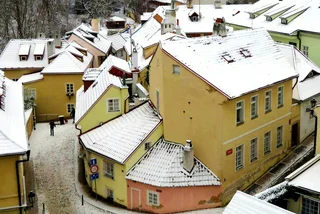Govt. restricts movement in three Czech districts due to COVID
The Czech cabinet today restricted people's movement in the three worst COVID-afflicted districts of Cheb, Sokolov, and Trutnov. The ban on local residents' departure and the arrival of others goes into effect at midnight, Health Minister Jan Blatný told reporters Thursday. The first two districts are situated in the westernmost Karlovy Vary Region along the German border, the Trutnov district, in the east Bohemian Hradec Kralove Region, borders on Poland.
PARTNER ARTICLE
In these districts, it will also be mandatory to wear an FFP2 respirator or surgical masks which the govt. said it will distribute. The restriction will be in force until the end of the state emergency, which could end on Feb. 14 if parliament does not approve the cabinet's proposal to extend it.
Travel restrictions and exemptions
- Health officials are asking local employers to introduce home office and launch antigen testing.
- Police will supervise the measures' observance on the entry roads.
- Those who own real estate in the given districts, but do not have permanent residence will be banned from entry.
- People may feed domestic animals and visit a church or an office, but must show proof of their travel purpose.
- The measures do not apply to transit, but truck drivers will be banned from stopping in the three districts.
- Schoolchildren, those commuting to work or having to leave their district for safety reasons are exempted from the travel ban.
Blatný said the toughening of restrictions is the result of the soaring infection numbers, which is up to four times higher in here than in any other of the Czech Republic's 76 districts, and the subsequent overloading of local hospitals.
The Czech state of emergency is set to expire on Sunday. The minority cabinet has asked the lower house of parliament to approve the emergency's extension until Mar. 16, but still lacks the opposition's support for its proposal. Czech Prime Minister Andrej Babiš said Wednesday that those who do not vote for the extension would bear responsibility for people's deaths.
WHO: Czech mistrust in government driving spread
The results of a poll conducted by the World Health Organization and the Czech Medical Society and released Wednesday suggest that Czechs' mistrust in the government and failure to comply with restrictions are major factors in the infection's rapid spread.
"It has turned out that Czech society includes a big share of people who prefer personal freedom to respecting others, which is disadvantageous at the time of a pandemic," said Helena Hnilicova, from Charles University's Institute of Public Health and Medicine Law.
According to the poll, conducted by the Ipsos agency on 1,000 respondents in August, November, and January, only half of Czechs (46 percent) stay at home if experiencing COVID symptoms. Research also revealed that 16 to 33 percent of Czechs do not observe the basic hygienic measures of hand washing, face-mask wearing, and social distancing.
Forty-five percent of Czechs consider the epidemic a media bubble, fewer than last August's 57 percent. Only 18 percent consider it a high risk, the poll showed.
According to 40 percent of the respondents, the current epidemic lockdown measures unnecessarily restrict their personal freedom.
The poll showed that 76 percent of people mistrust the cabinet and 66 percent mistrust the Health Ministry while 80 percent trust medical workers. Paradoxically, this has resulted in people flouting government restrictions and relying on the healthcare system's help, Hnilicova said.
First suspected death due to COVID vaccine reported
Seven million people may be vaccinated against COVID-19 in Czechia by August, Health Minister Jan Blatny told iROZHLAS.cz Wednesday, adding that the vaccination should accelerate in April when millions of doses of vaccine are to reach the country.
Until April, the incoming number of doses will enable to vaccinate some 400,000 people only, he said.
The ministry hopes to vaccinate 60 to 70 percent of the population by summer.
Vaccination started in the Czech Republic on Dec. 27. As of Tuesday evening, 382,416 doses have been administered. A total of 116,622 people have received both doses of the vaccine so far.
"If the vaccines arrive in our country as expected, which is beyond my control but I cannot imagine this not happening, I think that enough people will have been vaccinated in the summer for us to prevent the virus' further community spread. This will bring about a crucial change in the life of all," Blatny said.
Pfizer/BioNTech and Moderna vaccines have been used in the Czech Republic so far, and AstraZeneca vaccines began distribution this week. The vaccination priority groups are medical workers, clients, and personnel of elderly homes and social care facilities and all people over 80.
The Czech State Drugs Control Institute (SUKL) received a report Wednesday on a death possibly related to COVID-19 vaccination. The senior patient, who was in the terminal stage of another disease, received the first dose on Jan. 9; those reporting his death suspect it to be in connection with the vaccination. SUKL did not specify the type of vaccine but the Pfizer/BioNTech vaccine was the only vaccine available in the Czech Republic at the time. SUKL is investigating the death.
Latest COVID-19 data from the Czech Ministry of Health (Feb. 11, 2021)
The PES anti-epidemic system's risk index remains at 71 on a 0-100 scale for the fifth day in a row today. The average number of new infections per 100,000 inhabitants has increased, with the reproduction number now standing at 1.04, the Czech Health Ministry's morning data shows.
- Active cases 96,759
- New cases 9,446
- Deaths 17,772
- Currently hospitalized 5,817
- PCR tests performed 4,829,762
- Antigen tests performed 1,889,712
- Reported vaccinations 399,896












 Reading time: 4 minutes
Reading time: 4 minutes 































